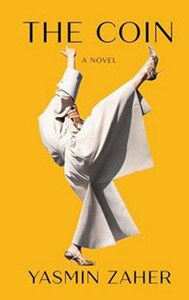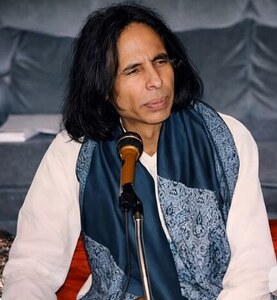
It is quite interesting that Balochistan is replete with stories of ‘wanderers’.
Having grown up in the province, I have come across plenty of such stories. Some were of my own relatives, who thought nothing of going off to visit a distant town on foot, often walking for days. Not so long ago, I lost a relative called Deedag, who lost his way and, as a result, died of hunger and thirst. Although he had never attended school, and was called a ‘ganok’ [mad person], his wandering had turned him into a poet and singer.
Indeed, that is the hidden power of wanderers; they unearth themselves while wandering across the earth.
In many parts of Balochistan, locals still travel on foot from one village to another, from one town to the next. It is part of their daily life. All of this was rekindled in my subconscious — memories I had long forgotten in the hustle and bustle of city life — when I read Javed Amir’s recent book A Wanderer Between the Worlds. But interestingly, he discusses writers and their works in the hustle and bustle of city life too.
Amir is a modern wanderer, equipped with a pen, an idea and a plot. His objective is to explore the world through its writers, artists, photographers and others of a similar ilk and bring them to light through his writings. In the first chapter, ‘Wanderlust and the Joys of Travel’, he writes about his purpose as a traveller: “to explore a deeper connection with the spirit or the soul of the place I am visiting.” He further adds: “I try to achieve that goal by searching through the lives of the writers, poets, painters and musicians who have inhabited that place.”
A former diplomat-turned-wanderer attempts to unearth the soul of places he visits by connecting them to writers and artists who lived there
Other than being a former diplomat, Amir is a prolific writer and has authored several books. His privileged background enabled him to travel across five continents over the past 50 years. But his passion for travelling knows no rules or boundaries, which is why he has ensured that his surroundings are conducive to cultivating this passion, so much so that he resigned from his job before superannuation just so he could do what he wanted to do. He states that he was “born under a wandering star”, and perhaps this is why he refers to himself as a “writer-wanderer.”
In the second chapter, ‘What is Literary Travel?’, he writes that he achieved what he aspired to throughout his life, pointing out that “to unearth the soul of a place you have to seek the writer who is the voice of the place or the painter of that landscape.”
Amir hails from Lahore, the provincial capital of Punjab, and it is clear that the cosmopolitan city’s rich cultural and literary background played a strong role in moulding him, refining the senses and allowing him to fall in love with art, literature and photography. He dedicates the chapter ‘The Role of Lahore: A City that Defines Me’ to his coming of age in the 1950s and ’60s.
“Lahore’s art, music and literary culture knew no boundaries,” he writes. “Painters [such as] Chughtai, Shakir Ali, Iqbal Hussain, musicians [such as] Mehdi Hasan, Malika Pukhraj, iconic writers [such as] Iqbal, Faiz, Manto created artistic masterpieces that were acclaimed beyond Lahore.”
In the digital age, the computer keyboard has replaced the pen, making it somewhat easier to squeeze the mind for words that are typed into sentences to express one’s thoughts. Similarly, travelling is now far more comfortable and easier than it was half a century ago. And Amir makes sure to squeeze every experience that will make his book captivating.
For enthusiasts of culture, A Wanderer Between the Worlds serves as a kind of review of writers, painters and photographers, their works and the places where they lived. The book is a window and, at the same time, a basket of treats and, yet again, a sort of connect-the-dots where he wants readers to unearth further and go into a frame wider than mere geography. In doing so, we are reminded of the true and productive sense of travelling.
For instance, in chapter four, ‘The Art of Travel Photography’, the author writes that “one of the greatest [qualities] of a photographer is patience.” Then he goes on to talk about the American street photographer Garry Winogrand, who “invariably excavates the beauty that is already there”, before moving on to discuss travel photography in greater detail. Concluding the chapter is a photo of Amir’s wife, the caption summing it all up: “Dramatic colour composition of the close-up of Clemencia’s radiant face reflecting the navy blue waters of Cote d’Azur.”
The most interesting part of Amir’s book are the literary travel essays that define the author’s great curiosity about literary figures and their works. He discusses Chilean poet and Nobel Prize winner Pablo Neruda, German writer Franz Kafka, Irish poet and dramatist William Butler Yeats and American poet T.S. Eliot at great length, and in a way that lets his readers move smoothly into the realm of literature.
The chapter on American journalist Henry Louis Mencken, in particular, is a most intriguing read. Wandering around Ellicott City — where Mencken spent a considerable amount of time — in the American state of Maryland, Amir quotes often from “the impossible journalist’s” 1919 book Prejudice and writes: “His book places political leaders into two categories: the demagogue, who ‘preaches doctrines he knows to be untrue to men he knows to be idiots’ and the demaslave, ‘who listens to what these idiots have to say and then pretends that he believes it himself.’”
The more arresting part is the epitaph which the journalist — who passed away in 1956 — had written for himself and with which Amir concludes the chapter ‘H.L. Mencken and Ellicott City: The Impossible Journalist’: “If, after I depart this vale, you ever remember me and have thought to please my ghost, forgive some sinner and wink your eye at some homely girl.”
I am also ready to forgive. In the recent past, I had wanted to go to New York — my intention was to visit the offices of one of my favourite magazines, The New Yorker. I thought my dream was about to come true when I was invited to participate in a conference, but the conference organiser turned out to be a fraud. The unfortunate episode was successful in dampening my enthusiastic outlook. Reading Amir’s book, however, has renewed in me the passion for travelling.
The reviewer is a member of staff.
He tweets @Akbar_notezai
A Wanderer Between
the Worlds
By Javed Amir
Imprint, Islamabad
ISBN: 978-9695520123
273pp.
Published in Dawn, Books & Authors, November 14th, 2021































